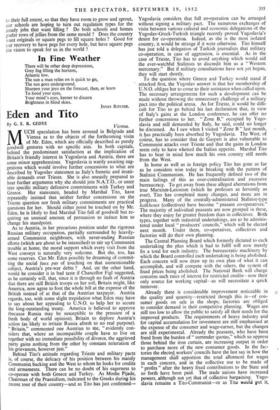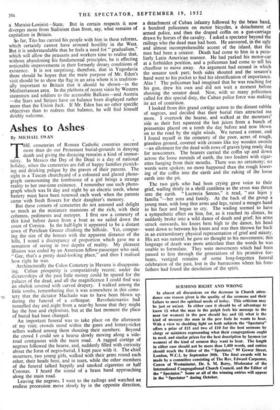Eden and Tito
By G. E. R. GEDYE Vienna.
MUCH speculation has been aroused in Belgrade and Vienna as to the objects of the forthcoming visits of Mr. Eden, which are officially described as purely goodwill gestures with no specific aim. In both capitals, behind the predominant satisfaction at the implication of Britain's friendly interest in Yugoslavia and Austria, there are some minor apprehensions. Yugoslavia is warily awaiting sug- gestions which would involve further concessions to what are described by Yugoslav statesmen as Italy's frenetic and insati- able demands over Trieste. She is also uneasily prepared to hear further arguments why she should join N.A.T.O., or enter into specific military defensive commitments with Turkey and Greece. Her statesmen, headed by Marshal Tito, have repeatedly insisted that neither further concessions on the Trieste question nor fresh military commitments are practical questions for her. Should either point be touched on by Mr. Eden, he is likely to find Marshal Tito full of goodwill but re- quiring an unusual amount of persuasion to induce him to change his standpoint.
As to Austria, in her precarious position under the rigorous Russian military occupation, partially surrounded by heavily- armed Communist neighbours, with never-ending Russian efforts (which are about to be intensified) to stir up Communist trouble at home, the moral support which every visit from the West conveys is naturally very welcome. But she, too, has some reserves. Can Mr. Eden possibly be dreaming of commit- ting the social faux pas of touching on that unmentionable subject, Austria's pre-war debts ? And, on the other hand, would he consider it in bad taste if Chancellor Figl suggested, as he certainly will, that, since it is through no fault of Austria that there are still British troops on her soil, Britain might, like America, now agree to foot the whole bill at the expense of the British instead of at that of the Austrian taxpayer. Austria regards, too, with some slight trepidation what Eden may have to say about her appealing to U.N.O. to help her to secure the long-outstanding treaty. America is believed to approve (because Russia may be susceptible to the pressure of a fresh body of world opinion), Britain to deplore Austria's action (as likely to irritate Russia afresh to no real purpose). " Britain," commented one Austrian to me, " evidently con- siders that, where an incompatible couple have to live on together with no immediate possibility of divorce, the aggrieved party gains nothing from the other by constant reiteration of his grievances, however just."
Behind Tito's attitude regarding Trieste and military pacts is, of course, the delicacy of his position between his mainly Communist backing and the West to whom he looks for credits and armaments. There can be no doubt of his eagerness to co-operate with both Greece and Turkey. As Moshe -Pijade; Chairman of the Praesidium, indicated to the Greeks during his recent tour of their country—and as Tito has just confirmed— Yugoslavia considers that full co-operation can be arranged without signing a military pact. The numerous exchanges of visits between various cultural and economic delegations of the Yugoslav-Greek-Turkish triangle recently proved Yugoslavia's desire for co-operation. Indeed, as she is the most isolated country, it would be strange if it were otherwise. Tito himself has just told a delegation of Turkish journalists that military co-operation, in case of aggression, is essential. As in the case of Trieste, Tito has to avoid anything which would aid the ever-watchful Stalinists to discredit him as a " Western mercenary." But if military consultations have not yet begun, they will start shortly.
To the question where Greece and Turkey would stand if attacked first, the Yugoslav answer is that her membership of U.N.O. obliges her to come to their assistance when called upon. The necessary arrangements for such a development can be made without throwing the unnecessary challenge of a military pact into the political arena. As for Trieste, it would be diffi- cult for Tito to go behind his last declaration that, in view of Italy's gains at the London conference, he can offer no further concessions to her. " Zone B," occupied by Yugo- slavia and still demanded by Italy, he said, could no longer be discussed. As I saw when I visited " Zone B " last month, it has practically been absorbed by Yugoslavia. The West, of course, has to consider that de Gasperi is also vulnerable to Communist attacks over Trieste and that the gains in London seem only to have whetted the Italian appetite. Marshal Tito has to bear in mind how much his own country still needs from the West.
In home as well as in foreign policy Tito has gone as far as he considers wise today in breaking with the pattern of Stalinist Communism. He has frequently defined two of the main failings of this as over-centralisation and excessive bureaucracy. To get away from these alleged aberrations from true Marxism-Leninism (which he professes as fervently as ever), Tito has completed many changes, and more are in progress. Many of the centrally-administered Stalinist-type kolkhoses (collectives) have become " peasant co-operatives." The majority of individual peasants are now grouped in these, where they enjoy far greater freedom than in collectives. Both types, together with industrial undertakings, are to be adminis- tered under local " producers' councils," which will be elected next month. Under them, co-operatives, collectives and factories will do their own planning.
The Central Planning Board which formerly dictated to each undertaking the plan which it had to fulfil will now merely fix a total for each industry. The bureaucratic machinery by which the Board controlled each undertaking is being abolished. Each concern will now draw up its own plan of what it can accomplish, and will compete with the others, the system of fixed prices being abolished. The National Bank will charge concerns such rates of interest for restricted credits—now their only source for working capital—as will necessitate a quick turnover.
Already there is considerable improvement noticeable in the quality and quantity—restricted though this is—of con- sumer goods on sale in the shops; factories are obliged to consider demand in their competitive planning. Wages are still too low to allow the public to satisfy all their needs for the improved products. The requirements of heavy industry and for capital accumulation for investment are still emphasised at the expense of the consumer and wage-earner, but the changes are still experimental. Already the peasants, who have been freed from the burden of " surrender quotas," which so oppress those behind the iron curtain, are increasing output in order to purchase more of the new consumer goods. In the fac- tories the elected-workers' councils have the last say in how the management shall apportion the total allotment for wages in each concern, and in the collective use to be made of "profits " after the heavy fixed contributions to the State and so forth have been paid. The trade unions have increased powers, although not yet that of collective bargaining. Yugo- slavia remains a Tito-Communist—or as Tito would put it,
a Marxist-Leninist—State. But in certain respects it now diverges more from Stalinism than from, say, what remains of capitalism in Britain.
So far, Tito has carried his people with him in these reforms, which certainly cannot have aroused hostility in the West. But it is understandable that he feels a need for " gradualism," which will allow the peasants and workers time to realise that, without abandoning his fundamental principles, he is effecting noticeable improvements in their formerly dreary conditions of existence. It is not surprising, therefore, that in Yugoslavia there should be hopes that the main purpose of Mr. Eden's visit should be to show the flag in an area where it is tradition- ally important to Britain that it ,should be shown—in the Mediterranean area. In the plethora of recent visits by Western statesmen and soldiers to the accessible Balkans—and Austria —the Stars and Stripes have on balance been displayed rather more than the Union Jack. If Mr. Eden has no other specific objectives than to redress that balance, he will find himself doubly welcome.



































 Previous page
Previous page